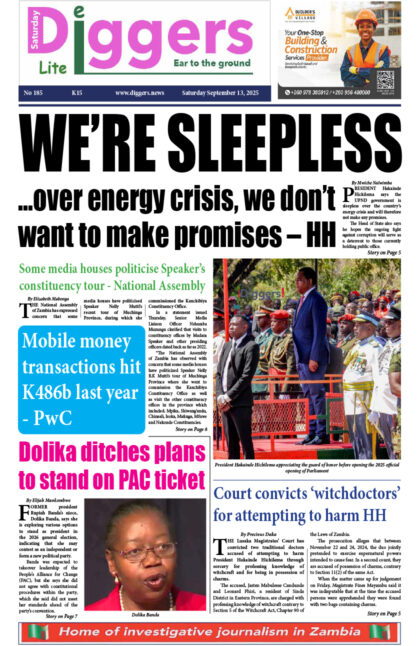An investigation has revealed that the private company that was granted a concession to implement the “Advanced Road Safety Management Solution and Services on behalf of the Road Transport and Safety Agency (RTSA) will take 90 per cent of all proceeds.
In August this year, the government, acting through RTSA entered into a hasty concession agreement with Intelligent Mobile Solutions (IMS), a company that is now mandated to manage motor vehicle registration and the installation of speed cameras among other obligations.
News Diggers revealed last week that government has further single sourced the said IMS company to take over the management of toll plazas around the country for 17 years, and to be collecting toll fees on behalf of the National Road Fund Agency and the Road Development Agency.
According to the ongoing News Diggers’ investigation, government will only take 10 per cent of the proceeds, while the Concessionaire would retain 90 per cent, to speed up its retain on investment in the first seven years.
“Subject to the foregoing provisions of this agreement, all user charges owing by users of the project facilities and for the provision of services rendered by the Concessionaire under this Agreement, including fines shall accrue to the Government; and the Concessionaire shall invoice the Agency for the equipment and services provided under the project,” read the second addendum to the concession agreement in part.
“The Agency shall pay the Concessionaire monthly service charges equal to: year 1 to year 7, 90 per cent of the revenue collected; year 8 to year 12, 80 percent of the revenue collected; year 13 to year 17, 70 percent of the revenue
collected from fines, vehicle inspection fees and vehicle registration fees. From fines generated by the system excluding speeding fines, the Agency shall pay the Concessionaire 20 per cent of revenue collected in year 1 to year 17, and 10 per cent of revenue collected from cross border violations.”
The haphazard concessions agreement signed between the government and IMS has, however, resulted in operational challenges following high compliance levels among motorists, leaving the two parties in a revenue-sharing squabble.
Last month, IMS Chief Executive Officer David Reynolds said the ministry of Finance was not remitting proceeds to the company, a situation that had led to serious financial and operational challenges.
He told employees who had not been paid for three months that the blame was on its clients RTSA and Ministry of Finance.
“You may be aware that IMS staff are yet to receive October Salaries. I can confirm that IMS has encountered some issues temporarily effecting flow of operational funding from its client, RTSA and the Ministry of Finance. All parties are working diligently to resolve the last remaining issue which has interrupted cash flow,” said Reynolds in a memo circulated to his staff dated November 20, 2018.
“I am confident that the problem will be resolved in due course. Thus I fully expect September, October and November salaries to be disbursed between the end of the month and the middle of December. Thank you for your support and understanding during this period.”
When asked about the revenue-sharing dilemma that his company had found itself in, Reynolds told News Diggers in an interview that there were no such problems with the deal and that all employees’ salaries were upto date.
But when told about the letter that he had signed, the IMS chief executive admitted that there were some problems which had since been resolved.
“Well, all matters like that would have to be handled by the executive chairman, but it’s not true to say that the staff haven’t been paid. In fact the staff have been paid and everyone is upto date… okay, that [notice that the Ministry of Finance and RTSA are not remitting finances to IMS] has now been resolved and they (workers) are all paid,’ said a jovial Reynolds.
Sources at IMS explained to News Diggers that the compliance levels among motorists had thrown the concession agreement in a financial dilemma.
“First it was the speed cameras, but that money has reduced significantly as people have become aware and compliant. So there is a plan to deploy more speed cameras secretly on other roads, as these cameras work best when people don’t know about them,” said a source who sought anonymity.
“But the next big money generator that they are pushing for will be the re-registration of vehicles. There are between 750, 000 to 1 million vehicles in Zambia; we don’t know exactly because the eZAMTIS system that they spent US$22 million on doesn’t even work properly. So for the re-registration of vehicles, at first they wanted to charge K1, 000 so that they could make about a billion kwacha. But they were told to reduce, as they were afraid that amount would create a backlash. So they are planning on charging K500 per car. But instead of a proper process – where there is a long transition period even up to a year or two. They want everything done in 3 months and the police command has already been briefed because they will be the ones to crack down heavily on un re-registered vehicles.”
But RTSA Head of Public Relations Fred Mubanga told News Diggers that it was not true that the agency was planning on installing secret cameras, adding that the idea was not to generate income, but to change the behavior of motorists.
On the financial challenges with IMS, Mubanga said the Agency had taken note of the situation facing the Concessionaire and that a remedial measure would be employed to resolve outstanding issues.
“Our comment is that we have noted the happenings at IMS, our partners, and as RTSA, we shall be engaging them to see how best this matter can be resolved,” said Mubanga.
“On the speed cameras, it is true that the compliance levels have improved, meaning that the number of people who are being charged for these offences has reduced. That’s the correct picture and that was the idea behind implementing this project. And it was anticipated that in the first month, the numbers would be high, and the fines would be more, but towards the end of the project the numbers would reduce. So that was anticipated, and it was not about revenue collection but changing the driver attitude. Therefore it cannot be true that we now intent to install secret speed cameras to catch unsuspecting motorists, that is not true.”
























